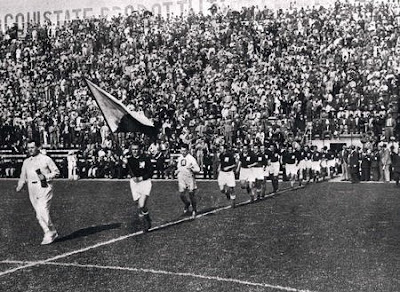
Football was an unknown sport in Iran until British workers introduced the game in the 1930's. At that time they were working at major oil refineries in the province of Khuzestan. The British played among themselves at first,as 22 men in shorts chasing after a plastic ball seemed to be more of a joke than a game to Iranians. The skepticism was short-lived and eventually the Iranian workers started playing as well, and in a small amount of time, football became extremely popular in Khuzestan. Clubs were established, and many travelled to Tehran and other cities to play other teams.Teams from Khuzestan were always the most successful was the powerhouse the 50's and early 60's, but the game had become very popular in Iran by then. Tehran slowly started becoming the football capital of Iran, and numerous great clubs emerged from there. Shahin FC, Oghab FC, and Taj, were all Tehran teams established in the mid 1940's which even to this day have a great following. As the number of club teams increased the need for a national league became apparent, and ever since 1960, with the exception of a few years, a nationwide football league has existed in Iran. The Takhte Jamshid Cup, Azadegan League and the IPL being the most important ones.The very first match that the Iranian national football team played was on January 1, 1941 away at Afghanistan. The first two decades of international football for Iran was uneventful, but the 60's and 70's was when Iran established itself as one of Asia's top sides. They won the Asian Cup in 1968, 1972 and 1976, the 1974 Asian Games football tournament, qualified for the 1972 and 1976 Olympic Games and most importantly qualified for World Cup 1978 in Argentina.The Iranian Revolution and the Iran-Iraq War soon occurred and football was downplayed, but the national team has made a comeback in recent years, qualifying for the 1998 Football World Cup and recording their first win ever in World Cup (against the United States) and also qualifying for the 2006 tournament in Germany.
--------------------------------------------------------------------------------
Fußball im Iran


Fußball war ein unbekannter Sport im Iran, bis britische Arbeiter das Spiel in den dreißiger Jahren vorstellten. Zu dieser Zeit arbeiteten sie an den Hauptölraffinerien in der Provinz von Khuzestan. Die Briten spielten unter selbst anfangs, da 22 Männer kurz gesagt jagend nach einer Plastikkugel schienen, mehr eines Witzes als ein Spiel zu Iraniern zu sein. Die Skepsis war kurzlebig und schließlich fingen die iranischen Arbeiter an, außerdem zu spielen, und in einer kleinen Zeitmenge, wurde Fußball in Khuzestan extrem populär. Vereine wurden hergestellt und viele reisten zu Tehran und andere Städte, zum anderen teams.Teams von Khuzestan zu spielen waren immer waren das Elektrizitätskraftwerk die fünfziger Jahre und die frühen sechziger Jahre das erfolgreichste, aber das Spiel war im Iran bis dahin sehr populär geworden. Tehran langsam das begonnene Werden das Fußballkapital vom Iran und die zahlreichen großen Vereine tauchten von dort auf. Shahin FC, Oghab FC und Taj, waren alle Tehran Mannschaften, die die mittleren vierziger Jahre hergestellt wurden, die sogar zu diesem Tag ein großes Folgen haben. Während die Zahl Vereinmannschaften sich erhöhte, wurde die Notwendigkeit an einer nationalen Liga offensichtlich, und seit 1960, mit Ausnahme von einigen Jahren, hat eine allgemein Fußballliga im Iran bestanden. Die Takhte Jamshid Schale, Azadegan Liga und das IPL, das wichtigsten ist. Das allererste Gleiche, das die iranische nationale Fußballmannschaft spielte, war an Januar 1, 1941 weg bei Afghanistan. Die ersten zwei Dekaden des internationalen Fußballs für den Iran waren uneventful, aber die sechziger Jahre und die siebziger Jahre waren, als der Iran als eine von Asiens oberen Seiten sich herstellte. Sie gewannen die asiatische Schale 1968, 1972 und 1976, das Fußballturnier mit 1974 asiatische Spielen, qualifiziert für die 1972 und 1976 olympischen Spiele und für Weltschale 1978 in Argentinien am wichtigsten qualifiziert. Die iranische Revolution und der der Iran-Irak Krieg traten bald auf und Fußball wurde untertrieben, aber die nationale Mannschaft hat ein Comeback in den letzten Jahren gebildet, qualifiziert für die Fußball-Weltschale 1998 und ihren ersten Gewinn in der Weltschale überhaupt notiert (gegen die Vereinigten Staaten) und für das Turnier 2006 in Deutschland auch qualifiziert



















































